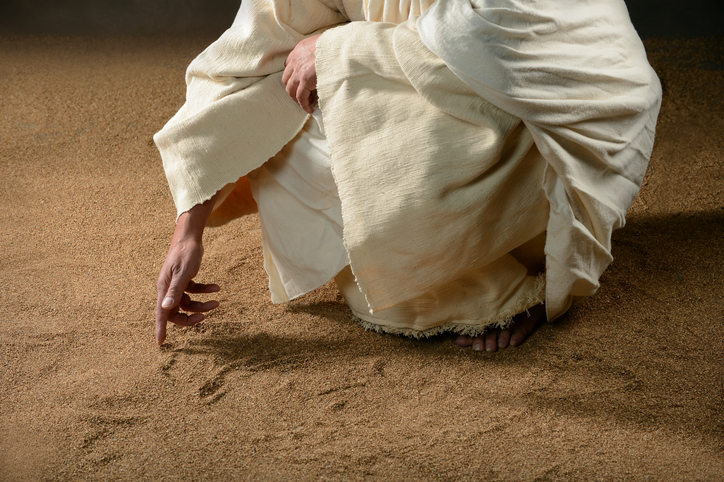The Gospel reading today is much richer than the surface understanding that Jesus was merciful. Though his mercy is certainly shown in this verse, there is something deeper going on here that speaks to the level of God’s love and reminds us of Theosis, one of the most central teachings of the Catholic Church.
Here in this verse, Jesus states clearly that he who is without sin should cast the first stone. One by one everyone leaves, knowing they have all sinned. But then Jesus says the important words, “Neither do I condemn you.”
The same words that redeem this woman condemn Jesus himself. In saying he does not condemn her, he groups himself with those who have sinned. He takes on the sin of this woman and the sin of all those around her and though he could not be more different in his perfection, he associates with the sinner. Part of the reason that God became one of us is to take on our sin in order that we might rise above it. But not just rise above it to live according to the law, rise above it to the point that we can become divine.
God’s plan for us from the beginning was to participate intimately in his very divinity. Adam and Eve were set up for this beautiful destiny, but sin got in the way. The only way to pay back a blow against an infinite being is for that being to become one of us, or as scripture says “to become sin,” in order to redeem us.
But not just to redeem us, his love is so deep that he doesn’t just want to wipe away our sin. He wants to get his original plan back on track. He wants us to participate perfectly and completely in his divinity itself. He became sin so that we might become him. Or as the Catechism puts it, “God became man so that man might become God.” Our destiny is not only that of redemption but also of divinization.
When we get to heaven we will not just go back to the garden, we will go beyond. Scripture says there will be a new heaven and a new earth, not a return to the old. That sounds pretty great to me. As we journey through the pains of repentance during this Lent, remember that Jesus himself experienced these pains, even though he was innocent. He paid it all so we might eventually experience all of him. That is cause for rejoicing even through this penitential time. From all of us here at Diocesan, God Bless!

Tommy Shultz is a Solutions Evangelist for Diocesan. In that role, he is committed to coaching parishes and dioceses on authentic and effective Catholic communication. Tommy has a heart and a flair for inspiring people to live their faith every day. He has worked in various youth ministry, adult ministry, and diocesan roles. He has been a featured speaker at retreats and events across the country. His mission and drive have been especially inspired by St. John Paul II’s teachings. Tommy is blessed to be able to learn from the numerous parishes he visits and pass that experience on in his presentations. Contact him at tshultz@diocesan.com.

